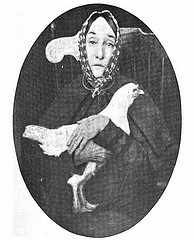
Nancy Luce is remembered as a terrible poet, but her life was so sad that it’s hard to laugh. Described by one writer as “chicken mad,” Luce spent 76 years on Martha’s Vineyard, cultivating her birds as personal friends and selling poems about them to tourists. The poems reveal such misery that they can be moving despite their strangeness:
Poor little heart, she was sick one week
With froth in her throat,
Then 10 days and grew worse, with dropsy in her stomach,
I kept getting up nights to see how she was. …
Poor little Ada Queetie’s last sickness and death
Destroyed my health at an unknown rate,
With my heart breaking and weeping,
I kept the fire going night after night,
To keep poor little dear warm.
This was real pain, but visitors saw only an eccentric old woman. She died in 1890, unlamented — and tourists today leave plastic chickens on her grave.



